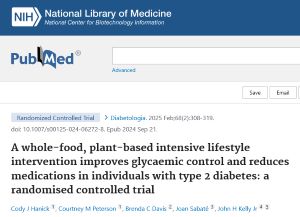Study Examines the Use of a Whole-Food, Plant-Based Diet in Type 2 Diabetes
by Reed Mangels, PhD, RD
More than 11% of the population of the United States has type 2 diabetes (1), which used to be known as adult-onset diabetes. In the United States in 2022, the most recent year for which information is available, the total cost of diabetes was $412.9 billion (1). This includes both direct medical costs and indirect costs such as reduced employment due to diabetes. People with diabetes in the United States had average medical expenditures that were 2.6 times higher than people without diabetes (1). Worldwide, about 12.5% of adults are estimated to have diabetes (2).
Diet is an important part of the treatment of diabetes. Research supports the use of vegetarian or vegan diets in treatment of diabetes (3) and several organizations including the European Association for the Study of Diabetes (4) and Diabetes Canada (5) back the use of vegetarian/vegan diets to manage type 2 diabetes.
A recent study conducted in the Republic of the Marshall Islands examined the use of a whole-food, plant-based diet in people with type 2 diabetes (6). Although a whole-food, plant-based diet is often identified as a vegan diet, the diet used in this study could include animal products.
What is the study?
The study was the longest and largest trial so far of a whole-food, plant-based diet compared to standard medical care in people with type 2 diabetes. Study participants, 149 of whom completed the study, were assigned to either follow a whole-food, plant-based diet along with moderate exercise or to receive their standard medical care for 24 weeks. At the start of the study, most participants were taking medications to control their blood glucose levels.
The whole-food, plant-based diet, as prescribed, was high fiber and low in fat and saturated fat. It featured foods that are commonly eaten in the Marshall Islands. For the first 2 weeks of the study, participants were told to completely avoid animal products. Later they could consume small amounts of animal foods, oils, and processed foods. Records were not kept of what people actually ate so we don’t know how well they complied with the diet. This group was instructed to exercise for an hour a day for the first two weeks and then for 30 minutes to an hour daily for the remainder of the study.
The subjects in the standard care group were told to maintain their current diet and exercise habits.
What did this study find?
On average, participants in the whole-food, plant-based diet group had a greater decrease in their hemoglobin A1C compared to those in the standard care group. Hemoglobin A1C indicates what one’s average blood sugar levels are. More than 60% of those in the diet group reduced their glucose-lowering medications compared to 24% of those in the standard care group. The researchers noted that some of those in the standard care group were attempting to change their diet to be more like that of the diet group. None of the standard care group achieved remission of their diabetes, compared to 8% of those in the whole-food, plant-based group. Remission was defined as having satisfactory hemoglobin A1C levels after not using diabetes medications for at least 3 months. About 67% of those in the whole-food, plant-based diet group were able to reduce their dose of medications for heart disease compared to 15% of the standard care group.
Are there practical implications?
This study suggests that health care providers can recommend a whole-food, plant-based diet with moderate exercise for people with type 2 diabetes.
References:
- American Diabetes Association. Statistics About Diabetes. https://diabetes.org/about-diabetes/statistics/about-diabetes. 2023.
- International Diabetes Federation. Facts & Figures. https://idf.org/about-diabetes/diabetes-facts-figures/.
- Guest NS, Raj S, Landry MJ, et al. Vegetarian and vegan dietary patterns to treat adult type 2 diabetes: A systematic review and meta-analysis of randomized controlled trials. Adv Nutr. 2024;15:100294.
- Diabetes and Nutrition Study Group (DNSG) of the European Association for the Study of Diabetes (EASD). Evidence-based European recommendations for the dietary management of diabetes. Diabetologia. 2023;66:965-985.
- Diabetes Canada Clinical Practice Guidelines Expert Committee, Sievenpiper JL, Chan CB, Dworatzek PD, Freeze C, Williams SL. Nutrition therapy. Can J Diabetes. 2018;42 Suppl 1:S64-S79.
- Hanick CJ, Peterson CM, Davis BC, et al. A whole-food, plant-based intensive lifestyle intervention improves glycaemic control and reduces medications in individuals with type 2 diabetes: a randomised controlled trial Diabetologia. 2025;68:308-319.
To read more about vegetarian/vegan diets and diabetes see:
Vegan Menu for People with Diabetes
Book Review: The Plant-Powered Plan to Defeat Diabetes
Dietary Factors Associated with Type 2 Diabetes
A Vegan Diet May Reduce the Risk for Developing Type 2 Diabetes in Overweight Adults
The contents of this website and our other publications, including Vegetarian Journal and Vegan Journal, are not intended to provide personal medical advice. Medical advice should be obtained from a qualified health professional. We often depend on product and ingredient information from company statements. It is impossible to be 100% sure about a statement, info can change, people have different views, and mistakes can be made. Please use your best judgment about whether a product is suitable for you. To be sure, do further research or confirmation on your own.

